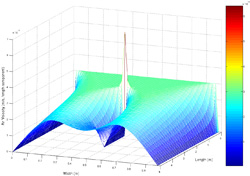Analysis

Navier-Stokes differential equations used to simulate airflow around an obstruction.
Mathematical analysis covers a wide range of different subjects. Areas currently active at Cornell include: dynamics, harmonic analysis, potential analysis, partial differential equations, geometric analysis, applied analysis, and numerical methods. In addition, we value the many interactions with other areas such as differential geometry, geometry, Lie theory, combinatorics, and probability.
Notable contributions of Cornell faculty to analysis include: Larry Payne’s work on ill-posed problems, Len Gross’s logarithmic Sobolev inequality, Strichartz’s estimates, James Eell’s work on harmonic maps (joint with J. Sampson), and Richard Hamilton’s seminal contribution to the Ricci flow.
Field Members
Emeritus and Other Faculty
Graduate Students
Activities and Resources
- Analysis Seminar
- Dynamical Systems Seminar
- Geometric Analysis Seminar
- Scientific Computing and Numerics Seminar
- 5th Cornell Conference on Analysis, Probability, and Mathematical Physics on Fractals
- Research Experiences for Undergraduates
- Dynamics at Cornell — dynamical systems software and information